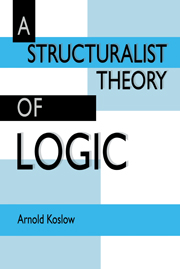Book contents
- Frontmatter
- Contents
- Preface
- Part I Background
- Part II Implication relations
- Part III The logical operators
- 11 Hypotheticals
- 12 Negations
- 13 Conjunctions
- 14 The disjunction operator
- 15 The logical operators parameterized
- 16 Further features of the operators
- 17 The dual of negation: Classical and nonclassical implication structures
- 18 The distinctness and relative power of the logical operators
- 19 Extensionality
- 20 Quantification
- 21 Identity
- 22 Special structures I: Logical operators on individuals: Mereology reconstituted
- 23 Special structures II: Interrogatives and implication relations
- 24 Completeness
- Part IV The modal operators
- Appendix A An implication relation for the integers in the programming language BASIC
- Appendix B Symmetric sequents as products of implication relations and their duals
- Appendix C Component-style logical operators and relevance
- Notes
- Bibliography
- Index
- Frontmatter
- Contents
- Preface
- Part I Background
- Part II Implication relations
- Part III The logical operators
- 11 Hypotheticals
- 12 Negations
- 13 Conjunctions
- 14 The disjunction operator
- 15 The logical operators parameterized
- 16 Further features of the operators
- 17 The dual of negation: Classical and nonclassical implication structures
- 18 The distinctness and relative power of the logical operators
- 19 Extensionality
- 20 Quantification
- 21 Identity
- 22 Special structures I: Logical operators on individuals: Mereology reconstituted
- 23 Special structures II: Interrogatives and implication relations
- 24 Completeness
- Part IV The modal operators
- Appendix A An implication relation for the integers in the programming language BASIC
- Appendix B Symmetric sequents as products of implication relations and their duals
- Appendix C Component-style logical operators and relevance
- Notes
- Bibliography
- Index
Summary
It will prove useful in this study to split the operators into two groups: the hypothetical, negation, conjunction, and disjunction in one group; quantification and identity in the other. In studying the features of these operators it will be convenient as well to begin with a simple characterization of each of them. Later (Chapter 15) we shall describe the official, parameterized forms for them. This division into the simple and the parameterized forms segregates the features of the logical operators in a way that makes for a more perspicuous picture, but separates the features in a way that has its own theoretical interest. We begin with the simple, unparameterized story.
The simple characterization
If I = 〈S, ⇒〉 is an implication structure, then the hypothetical operator H (on I) is the function H⇒ that assigns to each pair 〈A, B〉 of members of S a special subset H(A, B) of S. The special character of the subset is given by a condition that characterizes the function H– just as the special characters of the other logical operators are brought out by certain conditions that characterize them in turn. In fact, as we shall see, all the members (if there are any) of H(A, B) are equivalent to each other with respect to the implication relation “⇒” of S, so that often we shall simply refer to the hypothetical H(A, B) as if it were a member of S rather than a subset of S.
- Type
- Chapter
- Information
- A Structuralist Theory of Logic , pp. 77 - 90Publisher: Cambridge University PressPrint publication year: 1992



